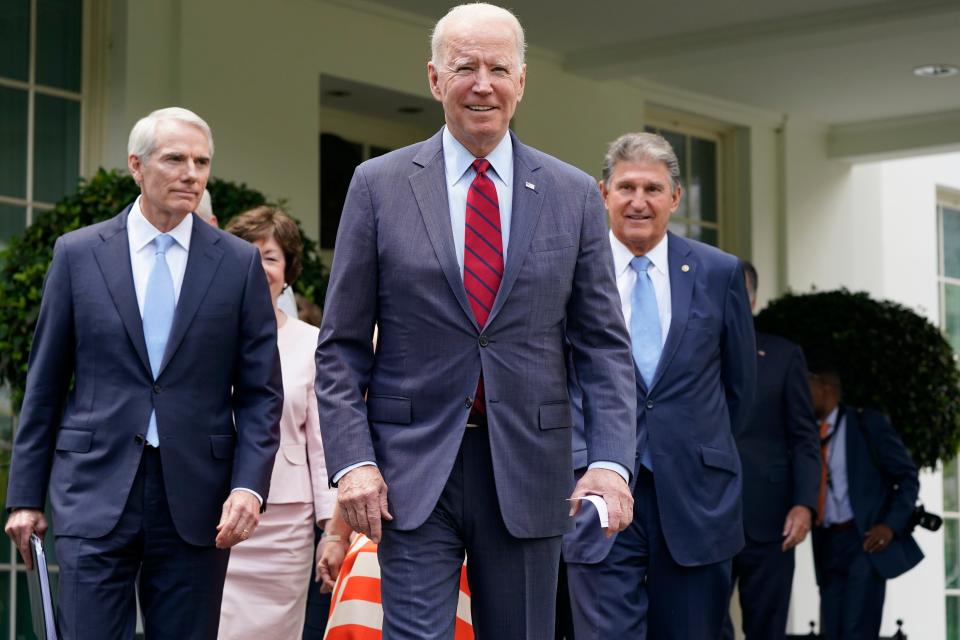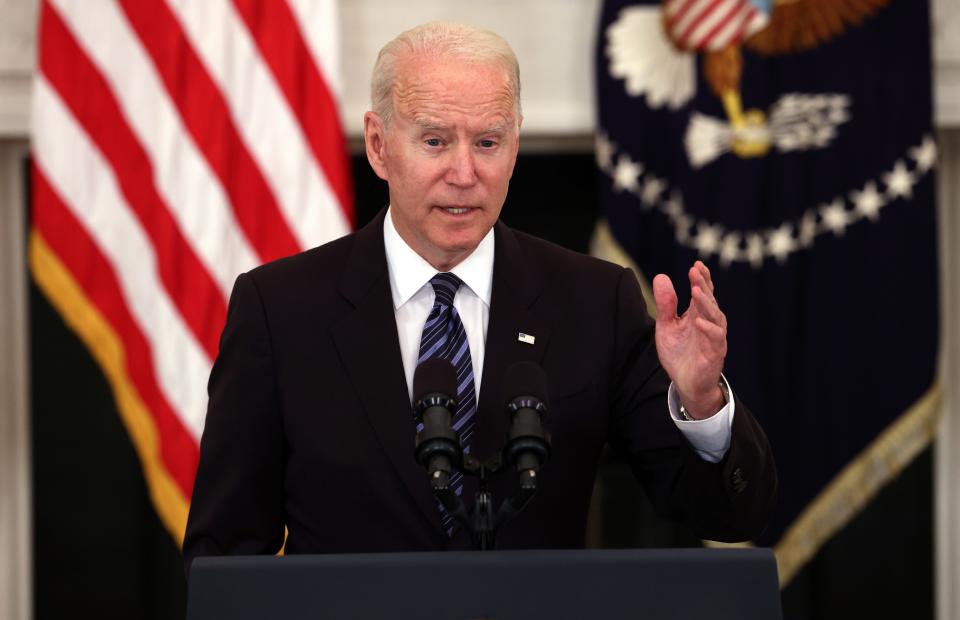'We have a deal': Biden reaches $1.2 trillion infrastructure compromise with bipartisan group of senators
WASHINGTON – President Joe Biden and a bipartisan group of 21 senators reached a compromise Thursday to modernize the nation's deteriorating transportation and public works systems, putting the president in position to pass the first plank of his sweeping infrastructure agenda.
Yet Biden made clear he would only sign a bipartisan infrastructure bill if Congress also approves a larger measure focused on "human infrastructure" programs like subsidized child care, home caregiving and climate change that only Democrats support.
Biden announced the breakthrough after a 30-minute meeting with the senators in the Oval Office, ending a weekslong stalemate over the price tag and how to pay for what would be the largest transportation package ever approved by Congress.
The $1.2 trillion plan includes $579 billion in new spending over eight years, focusing only on physical infrastructure such as roads, bridges, rail, broadband internet, water and sewer pipes, and electric vehicles. It proposes several ways to pay for the spending – including beefing up IRS tax enforcement – that avoid a gas tax increase that Biden resisted and a corporate tax hike that Republicans opposed.
"We have a deal," Biden said, smiling as he joined 10 of the senators outside the west wing on Thursday. "We made serious compromise on both ends."
More: $1.2 trillion bipartisan infrastructure deal gaining steam on Capitol Hill
Although not a guarantee to pass Congress, the compromise has strong odds even in a bitterly divided Congress. With the backing of 11 Republican senators and 10 moderate Democrats, the infrastructure bill would surpass the 60 votes required to overcome a filibuster if all Senate Democrats vote for it.
In remarks from the White House East Room, Biden touted the "long overdue" infrastructure investments that he said shows the world "we can function, deliver and do significant things." But he also called it a "big day" for only half his economic agenda.
In tandem, he said he will pursue separate legislation on "human infrastructure," which is opposed by Republicans and pushed by liberals. To pass the bill, he will have to rely on a legislative maneuver called reconciliation, which would allow Democrats to approve it with a simple majority in the 50-50 Senate, where Vice President Kamala Harris can break ties.
"We'll try to get some compromise there, and if we can't, I'll see if I can attract all the Democrats into a position," Biden said. "They're going to move on a dual track."
Some progressive Democrats have feared Biden's willingness to compromise with Republicans could jeopardize his more sweeping climate-change social safety-net initiatives. But Biden said he won't sign the bipartisan infrastructure bill into law unless a reconciliation bill with "human infrastructure" is also on his desk.
"If they don't (both) come, I'm not signing it. Real simple," Biden said.
IRS enforcement, public-private partnerships, unused relief funds
From the beginning of negotiations, Republicans didn't budge from their position that a bipartisan deal stick only to physical infrastructure and avoid tax increases that targeted corporations and the wealthy.
The bipartisan deal achieves both GOP aims. It proposes $312 billion for transportation, including $109 billion for repairs to roads and bridges, $66 billion for passenger and freight rail, $49 billion for public transit and $25 billion for airports. The compromise also includes $73 billion for electric and power infrastructure, $65 billion for broadband expansion and $55 billion for water and sewer projects.
"We didn't get everything we wanted," said Sen. Rob Portman, R-Ohio, one of the group's lead negotiators, but said the parties came together on a "core infrastructure package" without adding new taxes. "And with the commitment of Republican and Democrats alike that we're going to get this across the finish line."
To pay for infrastructure, senators and Biden agreed to more than a dozen funding sources led by strengthening the Internal Revenue Service to enforce tax collections. By going after those that owe taxes but don't pay them – particularly high-income earners – the federal government could recoup as much as $140 billion over eight years for a net gain of $100 billion that can be used to cover the cost of expanded infrastructure, said Sen. Mark Warner, D-Va., one of the senators who negotiated the deal.
Biden also agreed to repurpose unused COVID-19 relief funds passed in 2020 during the Trump administration as well as unused unemployment insurance benefits from Biden's American Rescue Plan, a COVID-19 relief bill made law earlier this year. Other sources include public-private partnerships, private activity bonds and asset recycling. The deal would create a new Infrastructure Financing Authority to issue bonds for clean transportation and clean energy.
Democratic leaders seek votes in July as McConnell blasts 'ultimatum'
Sen. Joe Manchin, D-W.Va., a key moderate swing vote, said the deal "meets the needs of the country for the 21st century." He wouldn't commit to supporting the reconciliation package but said he's committed to "working on it."
More: A new New Deal? How Biden's spending plans stack up to past presidential proposals

Democratic leaders outlined a quick timeline for both bills. Senate Majority Leader Chuck Schumer, D-N.Y., aims to have votes on both pieces of legislation in the Democratic-controlled House and Senate in July, before Congress departs for its summer recess the next month.
House Speaker Nancy Pelosi assured her fellow Democrats the House won’t take up the bipartisan infrastructure bill until the Senate sends over a bill focused on Biden's "human infrastructure."
“There won't be an infrastructure bill unless we have a reconciliation bill. Plain and simple.”
Senate Republican leadership blasted that arrangement, signaling a split from moderate GOP senators who led the compromise. Senate Minority Leader Mitch McConnell said Pelosi and Schumer “pulled the rug out from under their bipartisan negotiators” by saying that the infrastructure deal would only advance if it was tied to a vote on the larger reconciliation package.
“Less than two hours after publicly commending our colleagues and actually endorsing the bipartisan agreement, the president took the extraordinary step of threatening to veto it,” McConnell said on the Senate floor Thursday afternoon. “It almost makes your head spin: an expression of bipartisanship and then an ultimatum on behalf of your left-wing base.”
After Biden scaled back his initial $2.3 trillion infrastructure plan and agreed to seek approval of his other proposals separately, the biggest sticking point became how to pay for the bills. Republicans opposed unwinding former President Donald Trump's 2017 tax cuts, forcing Biden to retreat from his push to raise the corporate tax rate from 21% to 28% in the bipartisan package. The corporate tax hike and other taxes on the wealthy are expected to be in Democrats' reconciliation bill instead.
Republican senators proposed raising the per-gallon gas tax by tying it to inflation and new user fees for electric vehicles. But the White House stood firmly against both options, noting it would abandon Biden's pledge not to raise taxes on Americans earning less than $400,000.
"We've agreed on the price tag, the scope and how to pay for it," said Sen. Susan Collins, R-Maine. "It was not easy on getting agreement on all three, but it was essential."
Sen. Lisa Murkowski, R-Alaska, said the compromise sends a message "that we actually can work, that we actually can perform, that we can do something, not for Republicans or Democrats, but for Americans."
More: Biden ends infrastructure talks with GOP group of senators, pushes ahead with moderates
Progressives to hold Biden accountable for larger priorities
The bipartisan Senate talks started after Biden ended previous negotiations with Republican Senate committee leaders who had the backing of McConnell.
Although Biden's trimmed-down infrastructure proposal earned him support from Republicans – delivering on a campaign commitment to seek bipartisanship – he's gotten pushback from progressives, particularly climate advocates. They fear moderate Democrats won't vote for a reconciliation package now that they claim a bipartisan win on infrastructure.
"There will not be a bipartisan agreement unless – written in stone – there is an understanding that there will be a major, major reconciliation bill," Sen. Bernie Sanders, I-Vt, chairman of the Senate Budget Committee said on The Dean Obeidallah Show.

Lauren Maunus, advocacy director for Sunrise Movement, a youth-led environmental organization, said "we can’t afford to kick the can down the road any further" on climate-change initiatives. She called Biden's first proposal "already the compromise," arguing $1 trillion a year is needed to fight the climate crisis.
"When Democrats agree to water it down more, they’re condemning Americans to untold devastation," she said. “We demand no climate, no deal."
The 10 Senate Democratic caucus members who support the infrastructure deal are Manchin, Warner, Jeanne Shaheen of New Hampshire, Kyrsten Sinema and Mark Kelly of Arizona, Jon Tester of Montana, Chris Coons of Delaware, Maggie Hassan of New Hampshire and John Hickenlooper of Colorado. Angus King, an independent from Maine who caucuses with the Democrats, also endorsed the plan.
The 11 Republicans are: Murkowski, Collins, Portman, Bill Cassidy of Louisiana, Mitt Romney of Utah, Richard Burr and Thom Tillis of North Carolina, Lindsey Graham of South Carolina, Mike Rounds of South Dakota, Todd Young of Indiana and Jerry Moran of Kansas.
Biden expressed faith the Republican senators will keep their word and vote for the compromise. He singled out Romney, Collins and Murkowski, saying “they’ve never broken their words to me” and said he trusted them to “stick to the deal.'"
Romney said for “years and years people have been talking about infrastructure needs of our country," touting how his colleagues came together "and got a job done.”
“I don’t know how far it’s going to get,” he acknowledged. “I think it will get all the way. We’ve got the president behind it, this group here. But we’re going to keep working together. We’re not finished.”
Reach Joey Garrison on Twitter @joeygarrison.
This article originally appeared on USA TODAY: Biden, senators agree to infrastructure deal

 Yahoo Movies
Yahoo Movies 

